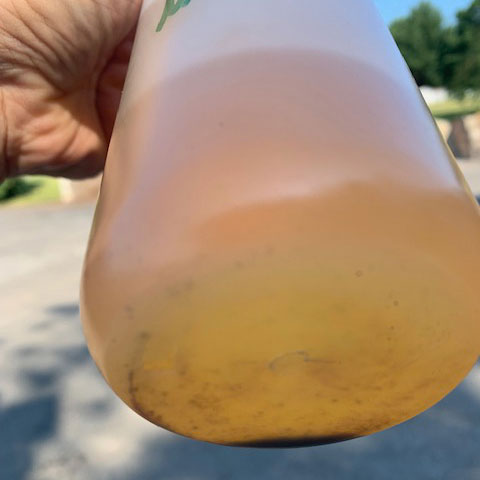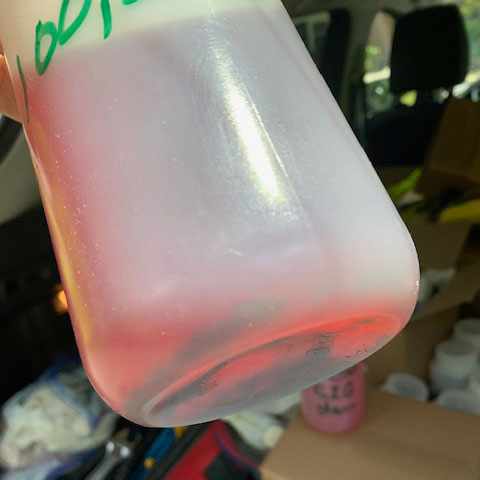 When diesel additives first became popular in the 1980s and 90s, many diesel users were skeptical of their supposed benefits. It was obvious that premium diesel treated with additives cost more than untreated diesel, but the differences in performance were unclear. This skepticism may have been warranted in the past when companies would overstate the pros of their products just to make a buck. However, with modern changes in diesel fuel composition and engine design, additives made by reputable companies can make a big difference in fuel performance and engine wear and tear.
When diesel additives first became popular in the 1980s and 90s, many diesel users were skeptical of their supposed benefits. It was obvious that premium diesel treated with additives cost more than untreated diesel, but the differences in performance were unclear. This skepticism may have been warranted in the past when companies would overstate the pros of their products just to make a buck. However, with modern changes in diesel fuel composition and engine design, additives made by reputable companies can make a big difference in fuel performance and engine wear and tear.
Why You Should Use Diesel Fuel Additives
Diesel treated with additives, also known as premium diesel, has many advantages over the untreated, standard diesel on the market today. According to Mark Smith, the National Sales Manager at Advanced Fuel Solutions,
“We are constantly fighting against ‘snake oil syndrome’ when educating our clients about the purposes and benefits of additives for modern ultra-low sulfur diesel.”
He explains that because diesel is not made with a high sulfur content the way it used to be, it has caused many unforeseen performance issues when paired with modern engines.
This new ultra-low sulfur diesel (ULSD) was introduced in 2006 for good reason by the EPA to reduce air pollution, acid rain, and other safety hazards caused by high-sulfur fuel. The mandated transition to ULSD was complete by 2010, and since then the EPA requires that all diesel supplied to the market must contain less than 15 ppm (parts per million) of sulfur. Though Smith notes, “To stay on the safe side, most fuel picked up at the terminal will actually have even less than 15 ppm. Some can have as low as 8-10 ppm.”
Thankfully, the change made diesel much safer and more environmentally friendly. However, it also had the unintended consequence of making diesel far less stable when exposed to high temperatures. To complicate things further, engine manufacturers must comply with the EPA mandate by designing engines that reduce emissions and increase fuel economy. The higher pressures and temperatures required to improve these new engines can unfortunately stress standard, untreated ULSD fuel close to the point of failure.
What Happens If You Don’t Treat Diesel with Additives?
Increased fuel instability due to untreated ULSD can lead to a number of usage issues including fuel injector failures, filter plugging, loss of power, and poor fuel economy to name a few. It also changes how diesel will function in long-term storage where it can be exposed to extreme temperatures, condensation, and oxidation. If you opt to forego additives, you may experience:
- Varnish & Sludge: Fuel oxidation leads to engine deposits that reduce efficiency and increase fuel system wear.
- Sediment & Particulate Matter: Particles like dirt, rust, and algae can fall out of suspension, clogging filters and injectors which reduces flow and degrades engine performance. Particulate matter will also adhere to tank walls and fuel lines, contributing to filter failures.
- Water Contamination & Microbial Growth: Water instigates corrosion which destroys storage tanks and engine componentry. Left untreated, bacteria and fungus can grow rapidly which degrades fuel and clogs filters.
- Premature Filter Replacement: Due to increased filter failures, you can expect to replace your filters more often and sooner than expected.
- Unscheduled Maintenance & Service Calls: Accelerated system wear and unanticipated engine or fuel tank issues mean you will have to spend more time and money on maintenance.
Check out these examples of what clear/on-road diesel and red-dyed/off-road diesel can look like before treatment with additives. Both fuel samples show water and sediment contamination, making the fuel appear cloudy and discolored. Due to the water contamination, there is also potentially a growth of active microbial bacteria, though only lab testing can confirm for sure.
- Contaminated Clear/On-Road Diesel
- Contaminated Red-Dyed/Off-Road Diesel
Common Types of Diesel Fuel Additives
There are many types of additives found in premium diesel, each serving a specific purpose. Many additive packages contain a custom mixture depending on the issues they aim to treat. Some common ones include:
- Detergents & Dispersants: Keeps the fuel injectors and combustion chambers clean, prevents deposit build-up, and promotes efficient combustion which reduces emissions.
- Stabilizers: Improves thermal stability and extends fuel shelf life by preventing oxidation and degradation.
- Corrosion Inhibitors: Protects metal surfaces within fuel systems, fuel lines, and storage tanks from rust and corrosion, prolonging their lifespan.
- Lubricity Agents: Enhances the lubrication properties of diesel to reduce wear and tear on engine components and extend engine life.
- Water Demulsifiers: Separates water from diesel fuel, preventing potential damage to the fuel system and engine.
- Anti-Gelling Agents & Cold Flow Improvers: Ensures a smooth engine start in winter by preventing the formation of paraffin crystals (known as fuel gelling) at cold temperatures that can block fuel lines and filters.
- Cetane Boosters – Improves the cetane number of diesel, leading to better combustion, increased power, and optimized engine operation.
- Anti-Foaming Agents: Reduces foaming during fueling, making it easier to fill the tank and ensuring accurate fuel measurement.
- Biocides: Kills bacteria and fungi that can grow in diesel fuel, especially in storage tanks.
Additives such as detergents, stabilizers, and corrosion inhibitors will be found in many general performance-boosting packages. Other more specialized additives like anti-gelling agents and biocides are more likely to be found in blends that are designed for specific needs like cold weather use or high-temperature storage.
Which Additives Does Hart Recommend?
For most situations, you will want to use an additive package that includes a broad range of beneficial additives. Advanced Fuel Solutions offers a comprehensive package called O.P.T. (Optimum Performance Technology) which we highly recommend and use in some of our premium diesel that is available in select locations*. This package is an all-in-one anti-foulant, detergent, fuel stabilizer, water dispersant, corrosion inhibitor, and lubricity agent that is designed to give fuel the ability to handle the high pressures and temperatures associated with modern diesel engines.
“Our goal is to provide solutions that actually work to improve the performance and reliability of diesel fuel,” says Mark Smith. “That’s why we aim to under-promise and over-perform so our product speaks for itself.”
The O.P.T. package has been tested and proven to extend preventative maintenance intervals, improve uptime, and restore fuel economy – all of which will save you money in the long run. Some other benefits of O.P.T. include:
- Optimizes injector performance and restores flow by eliminating deposits in the injector
- Reduces deposits, prevents blockages, and extends filter life
- Prevents corrosion and maintains optimum fuel quality
* The availability of our premium diesel treated with O.P.T. varies by location. To learn more about the options in your area, contact a member of our team today.
Not Sure Which Additives Will Solve Your Fuel Issues?


